新概念英语第一册Lesson71-72(课堂PPT)
新概念英语一册第71-72课件
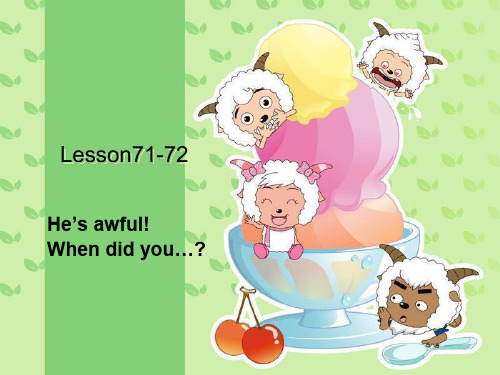
• • • •
句型转换: 1. It was an exciting finish. (变同义句) _____________________________ 2. You can see us. We are standing on the left.(合为一句) • ________________________ • 3. We were at church last Saturday.(对划线部分 提问) • ___________________________
JANE: What did your boss say to him? PAULINE: He said, "Pauline is typing letters. She can't speak to you now!" say (said) v 说(强调内容) say to sb speak to sb. 与某人说话 May I speak to Pauline, please? I’d like to speak to Pauline, please. 在电话中回答: This is….
What is sb. like? 询问某人的外貌或品行。 What's your father like? What’s … like? 什么怎么样?
What's the climate like in your country? What's the weather like in spring?
JANE: Did he telephone again last night? PAULINE: Yes, he did. He telephoned at nine o'clock. last year/ month / week/ night
新概念第一册71和72课课件
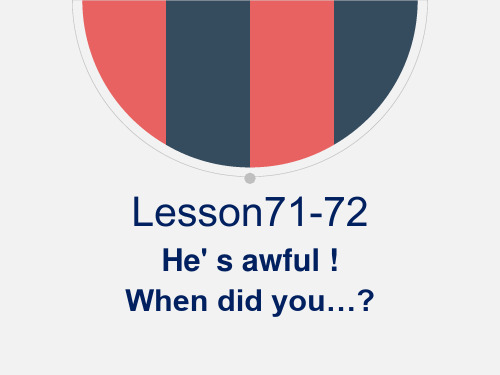
顾 动词的过去式表示,其否定句 和各种疑问句靠助动词did构成。
动词过去式的构成
注 意
做
1.一般在动词后直接加-ed)
笔
answer-answered wait---waited
记
2.以不发音的e结尾的动词直接加_d
哦!
telephone---telephoned arrive---arrived
Lesson71-72
He' s awful ! When did you…?
Presentation
I have a friend called Ron Marston. You know, he called me many times yesterday and the day before yesterday. He wanted me to see a movie with him, but I was very busy . Then at last, he called my office. How awful he is!
talk“谈论,谈话” talk about sth. 谈论…
Let's talk about our plan .
talk with sb. 和某人谈话
Lee is talking to his teacher ④ tell vt. “告诉,对某人讲…”
tell sb. sth. = tell sth. to sb.告诉某人… He didn't tell the bad news to little girl.
awful telephone [5C:fEl][5telIfEJn]time
[taIm]
anslawsetr [5B[l:Bn:ssEt]
新概念英语第一册 71、72课件
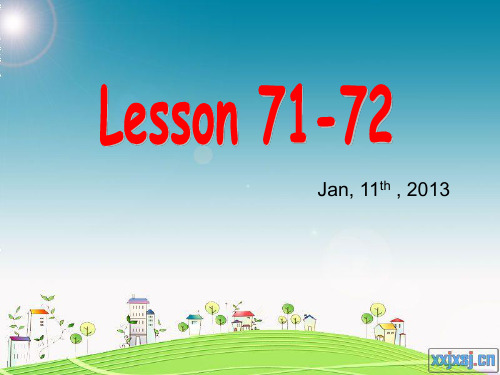
•逆时表达 3:50 ten to four 一刻钟/半点 5:15 a quarter past five 6:30 half past six 半小时之前用past 7:10 ten past seven 8:16 sixteen past eight 半小时以后用to 2:40 twenty to three 4:50 ten to five
Shedding tears 2012
A graduate becomes emotional at Fudan University in Shanghai, June 29, 2012.
Let’s review.
1.Time 时间表示法 •整点表示 1:00 one o’clock
•顺时表达 3:10 three ten
一般过去时动词变化规则
①直接加ed work—— worked look——looked play——played, ②以不发音e结尾的单词,直接加d live ——lived hope——hoped use——used, ③以辅音字母+y结尾的,变y为i加ed study—— studied carry——carried worry——worried, ④以元音字母+y结尾的,直接加ed enjoy ——enjoyed play——played
Shedding tears 2012
A baby cries while having his hair cut for Dragon Head-raising Day in Luoyang, Henan province, Feb 23, 2012, which marks the traditional Chinese festival Long Tai Tou (dragon head raising) and the start of spring and farming. During the festival, held on the second day of the second month of the lunar calendar, people play dragon lanterns, eat noodles, shave their heads, and pray for luck.
新概念英语第一册课件 NCE1 Lesson 71-72
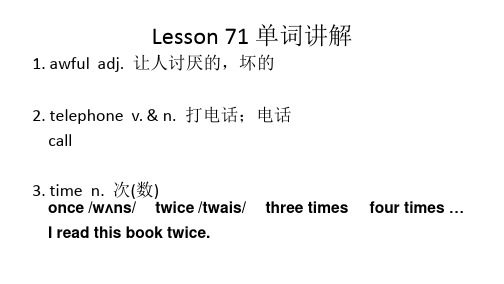
Lesson 71 单词讲解1.awful adj. 让人讨厌的,坏的2.telephone v. & n. 打电话;电话call3.time n. 次(数)once /wʌns/ twice /twais/ three times four times …I read this book twice.4.a nswer v. 接(电话)answer the phonest adj. 最后的,前一次的last night / last week / last month / last year6.phone n. 电话7.again adv. 又一次地Very nice to see you again.8.say (said) v. 说say /sei/ said /sed/ says /sez/say VS speaksay 强调说话的内容She said hello to me.He said sorry to me.My mom always says “Life was like a box of chocolate…”speak 突出说话的方式或动作本身speak loudly speak slowly speak EnglishLesson 71 课文讲解What is the climate like?What is the weather like?He telephoned me again.yesterday evening last nightLesson 71 语法讲解He was in the office.Was he in the office?Yes, he was. No, he wasn’t.He wasn’t in the office.Where was he?Who was in the office?There was a car race in our town in 1998. Was there a car race in our town in 1998? There wasn’t a car race in our town in 1998. What was there in our town in 1998?He went to school yesterday. do did /did/ Did wentDo he go he Do to school yesterday? ? e He like s coffee .He went to school yesterday. do notdid He donotgowent to school yesterday.He didn’t go to school yesterday.He went to school y e s t e r d a y. 他什么时候去上学了?did When do hegowent to school?He went to s c h o o l yesterday. 他昨天去哪了?did goWhere do he went yesterday?He w e n t to school yesterday. 他昨天干什么了?did doWhat do he did yesterday?He went to school yesterday. 昨天谁去上学了?Who went to school y esterday?She lived in New York.Did she live in New York? Yes, she did. No, she didn’t. She didn’t live in New York. Where did she live?Who lived in New York?I bought a book in that bookstore last week. bought /b ɔ : t/ buy 的过去式Did you buy a book in that bookstore last week? Yes, I did. No, I didn’t.I didn’t buy a book in that bookstore last week.When did you buy a book in that bookstore?Where did you buy a book last week?Lesson 72 单词句型讲解Today:this morningthis afternoonthis eveningLesson 72 单词句型讲解t onightLesson 72 单词句型讲解Yesterday:yesterday morningyesterday afternoonyesterday eveningLesson 72 单词句型讲解l ast nightThe day before yesterday:the day before yesterday in the morningthe day before yesterday in the afternoonthe day before yesterday in the evening如遇到视频无法正常播放,课件错误,知识点错t 误h 等e 课n 程问ig 题h ,t 可b 以e 添f 加o 服r 务e Ql Qa 3s 17t 0322794进行解决,学习问题请到知识堂: http:/Tomorrow:tomorrow morningtomorrow afternoontomorrow eveningtomorrow nightThe day after tomorrow:the day after tomorrow in the morningthe day after tomorrow in the afternoonthe day after tomorrow in the eveningthe night after next1.She is going to come now. (when)2.She can come now. (when)3.She wants a new bike. (what)4.There is a book on the table. (what)5.They like black coffee. (what)6.Mary comes from Germany. (where)7.He must go home now. (when)8.She feels ill. (how)9.He has a cold. (what)10.She cleaned her shoes. (when) A 一般疑问句B 特殊疑问句C 否定句1.She is going to come now. (when)Is she going to come now?When is she going to come?She isn’t going to come now.2.She can come now. (when)Can she come now?When can she come?She can’t come now.3.She wants a new bike. (what)Does she want a new bike?What does she want?She doesn’t want a new bike.• 4. There is a book on the table. (what)•Is there a book on the table?•What is there on the table?•There isn’t a book on the table.5.They like black coffee. (what) •Do they like black coffee?•What do they like?•They don’t like black coffee.6.Mary comes from Germany. (where) •Does Mary come from Germany?•Where does Mary come from?•Mary doesn’t come from Germany.7.He must go home now. (when) •Must he go home now?•When must he go home?•He needn’t / mustn’t go home now.8.She feels ill. (how) •Does she feel ill?•How does she feel?•She doesn’t feel ill.9.He has a cold. (what)•Does he have a cold?•What does he have?•What is the matter with him?•He doesn’t have a cold.10.She cleaned her shoes. (when) •Did she clean her shoes?•When did she clean her shoes?•She didn’t clean her shoes.。
新概念英语NCE1_lesson71-72(共46页)课件
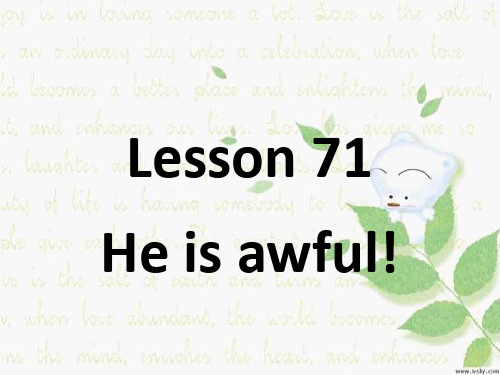
New words and
expressions
• awful • telephone • time • answer • last • phone • again • say (said)
adj. 让人讨厌的,坏的 v. & n. 打电话;电话 n. 次(数) v. 接(电话) adj. 最后的,前一次的 n. 电话(=ቤተ መጻሕፍቲ ባይዱelephone) adv. 又一次地 v. 说
玛丽拖了几分钟时间才去开门。 Mary took a few minutes to answer the door.
② v. 回答;答复 answer a letter 回信 我认为你没有回答我的问题。
I don’t think you’ve answered my
question.
③ n. 答案;解决办法;答复 • 我给他写了好几封信,可都没
• once,twice,three times
•on time 按时,准时 •in time 及时 •all the time 一直 •once upon a time 很久很久以前
★answer v. 接(电话)
① v. 对……作出反应;响应
• answer the phone/telephone 接电话 • answer the door/doorbell 应声开门
★awful
adj. 让人讨厌的, 坏的
• awfully adv. 非常 • (在表示负面的情景中,可用
awfully代替very) I am awfully (very) sorry.
★time n. 次(数)
• time在英语中作不可数名词时表示“时 间”;作可数名词时表示“次数”,三次 或三次以上通常用基数词+times表示:
新概念英语第一册71-72-PPT文档资料
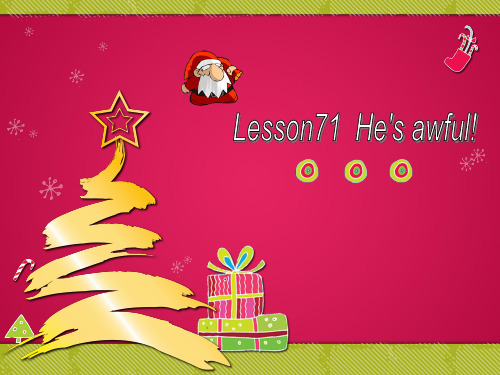
• arrive→
arrived
• plan→
planned
• telephone→ telephoned
• study→ studied
(过去发生, 现在已经结束了)
2. 常与表过去的时间状语连用,例: yesterday、 last、
in2019(过去时间).
3. 构成:动词用过去式
( is, am → was, are → were)
4. 规则动词过去式的构成
(1) 一般情况下,加ed。 ask -- asked watch -- watched (2) 以不发音e结尾,加d。 arrive -- arrived live -- lived (3) 重读闭音节词,先双写辅音字母,再加ed。 stop -- stopped drop -- dropped (4) 以辅音字母加 y 结尾的词,把y变i ,加ed。 carry -- carried study -- studied
5. again [ə‘gen] adv.又一次地
6. say [sei] v.说
7. last [lɑ:s t] adj.上一次的,最后的 词组: at last “在最后”
over
让人讨厌的,坏的 打电话/电话 次(数) 接(电话) 上一次的,最后的 一次
awful telephone time answer
写出下列动词的过去式
• answer→ answered
语法练习
• carry→ carried
• pass→
• air→
passed
aired
• empty→ emptied
• stay→ stayed
• open→
新概念英语一册第71-72课件

telephone/ call sb the answer to the question 问题的答案 打电话
JANE: What did your boss say to him? PAULINE: He said, "Pauline is typing letters.
JANE: What's Ron Marston like, Pauline? PAULINE: He's awful!
He telephoned me four times yesterday, and three times the day before yesterday. PAULINE: He telephoned the office yesterday morning
PAULINE: Yes, he did. He telephoned at nine
o'clock.
JANE: _W__h_a_tdid _y_o_u__ say to him?
PAULINE: I said, 'This isP_a_u_l_in_e_'_s_ mother.
Please don't _t_e_le_p_h_o__nemy daughter again!'
• 7.在左边
on the left
• 8.在比赛中
in the race
• 9.一场激动人心 an exciting finish 的结尾
• 10.在回家的路 on the way home 上
课文拓展
• There is (be的适当形式 ) a car race near our town every year. • In 1995, there was (be的适当形式 ) a very big race. • There were hundreds of people (数以百计的… ) there. • My wife and I were (be的适当形式 ) at the race. • Our friends Julie and Jack were (be的适当形式 ) there, too. • You can see us (we的适当形式 ) in the crowd. • We are standing (stand的适当形式 ) on the left. • There were (be的适当形式 ) twenty cars in the race. • There were (be的适当形式 ) English cars, French cars, German cars,
新概念英语一册第71-72课件

tonight
last night
the night before last
一般过去时的练习
She is airing the room now. She aired it yesterday. rained 1. It is raining now. It yesterday. 2. It is snowing now. It snowed yesterday. 3. He is boiling some eggs. He boiled some yesterday. 4. We are enjoying our lunch. We enjoyedit yesterday, too.
如: He didn’t telephon me four times yesterday.
本课重点语法
本课重点语法
一般过去过的几种基本句型 3.) 一般疑问句及其回答:
Did +主语+动词原形+其它?句末用问号。 肯定回答:yes, …did. 否定回答:No, …didn’t.
本课重点语法
一般过去时(II)句型:例句 如: 陈述句:I walked to school yesterday. 否定句:I didn’t walk to school yesterday.
注 意 做 笔 记 哦!
一般过去时的练习
air--- aired clean-- cleaned open-- opened arrive-- arrived shave-- shaved live-- lived type-- typed climb-- climbed call--called
注 意 做 笔 记 哦!
本课重点语法
新概念第一册71-72课课件[1]
![新概念第一册71-72课课件[1]](https://img.taocdn.com/s3/m/a16882e9102de2bd96058866.png)
telephone
ห้องสมุดไป่ตู้• 给某人打电话:telephone 给某人打电话: sb • 造句:这个讨厌的人总是给 造句: 我打电话。 我打电话。 • _____________________?
电话) ★answer v. 接(电话) 作出反应; ① v. 对……作出反应;响应 作出反应 • answer the phone/telephone 接电话 • answer the door/doorbell 应声开门 • 玛丽拖了几分钟时间才去开门。 玛丽拖了几分钟时间才去开门。 Mary took a few minutes to answer the door. 回答; ② v. 回答;答复 • answer a letter 回信 • 我认为你没有回答我的问题。 我认为你没有回答我的问题。 I don’t think you’ve answered my question.
★awful adj. 让人讨厌的,坏的 让人讨厌的, • awfully adv. 非常(在表示负面的情景中, 非常(在表示负面的情景中, 可用awfully代替 代替very) 可用 代替 ) I am awfully(very) sorry. ★time n. 次(数) • time在英语中作不可数名词时表示“时 在英语中作不可数名词时表示“ 在英语中作不可数名词时表示 作可数名词时表示“次数” 间”;作可数名词时表示“次数”,三次 或三次以上通常用基数词+times表示: 表示: 或三次以上通常用基数词 表示 once,twice,three times , , • on time 按时,准时 按时, • in time 及时 • all the time 一直 • once upon a time 很久很久以前
新概念英语NCE1_lesson71-72(共13页)课件

• Yes, he did.
• He telephoned (telephone的适当形式) at nine o'clock.
• What did (do的适当形式) you say to him?
您身边的小升初英语专家----鑫鹏学校新概念部
课文再现-英汉互译
• He‘s awful!
• Then I arrived home at six o'clock
• 他讨厌透了!
• What's Ron Marston like, Pauline? • 朗·马斯顿是怎样一个人?
• He telephoned me four times yesterday,
• 前天打了3次。
• He telephoned the office yesterday morning and yesterday afternoon.
• 他昨天上午和下午把电话打到了我的办 公室,
• My boss answered the telephone • 是我的老板接的。
• He said,‘Pauline is typing letters. • 他说:“波琳正在打信,
• What did she do yesterday? • She aired the room yesterday.
• 1 they/ clean their shoes/ yesterday • 2 he/ open the box/ last night • 3 they/ sharpen their pencils/ this morning • 4 she /turn on the television/this evening
新概念一第71-72课课件(完整版)
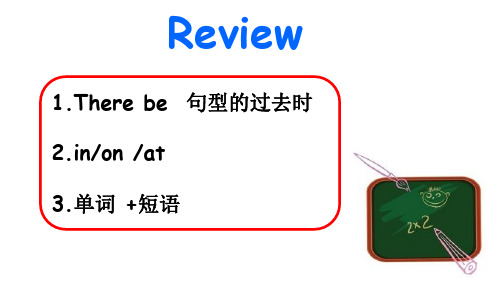
对以下句子的地点进行提问: • I am going to type the letter at home
tomorrow .
• I was at Lily's house last night .
小结:
1:划出句子中所要提问的部分。 2.when /where +然后把剩下的部分改成 一般疑问句
对以下句子的时间进行提问: • I am going to type the letter tomorrow .
• The teacher is busy(忙的) now .
• I was at Lily's house last night .
对“地点”的提问?
• in the classroom
PAULINE: He said, "Pauline is typing letters. She can't speak to you now!"
PAULINE: Then I arrived home at six o'clock yesterday evening.
He telephoned again. But I didn't answer the phone!
last [lɑ:st]
1) I was last in the car race . 2) I was at home last night .
time [taim]
1) What's the time ?
2)He telephoned me 4 times last night .
again [ə'ɡen]
e.g.I'm at home on weekends. When are you at home ?
新概念英语第一册 71-72课 47张PPT
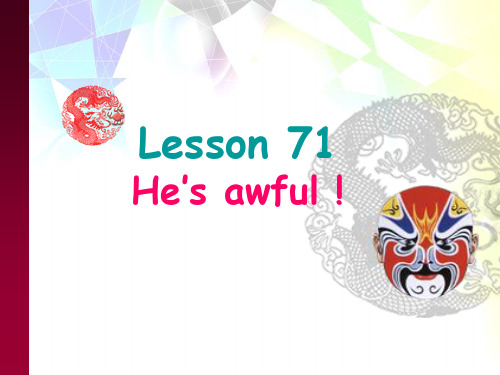
拓展:
once upon a time 很久很久以前
cheat the time 打发时间
We are cheating the time cards. 我们通过打牌打发时间。
watch one’s time 等待时机
I’m watching my time.
by playing
Words:
★ answer [ˈɑ:nsə] v. 接(电话)
① v. 对……作出反应;响应 answer the phone/telephone 接电话 answer the door/doorbell 应声开门 Mary take a few minutes to answer
the door. 玛丽拖了几分钟时间才去开门。
② v. 回答;答复
answer a letter 回信
I didn’t think you answered my question. 我认为你没有回答我的问题
③ n. 答案;解决办法;答复
I wrote him several letters but couldn’t get an answer. 我给他写了好几封信,可都没有回音。
Do you know the answer to Question 10? 你知道第10题的答案吗?
adj. 让人讨厌的,坏的 v. & n. 打电话;电话
n. 次(数);时间 v. 接(电话);回答
Words:
last [lɑ:st] phone [fəun] again [əˈɡein] say (said) [sei][sed]
adj. 最后的,前一次的 n. 电话(=telephone) adv. 又一次地 v. 说
新概念第一册第71课(课堂PPT)

其他语言点
answer the phone 接电话 He telephoned me yesterday. 打电话给某人 He telephoned the office yesterday. 给办公室打电话
21
其他语言点
This is Pauline’s mother. 我是… This is Susan. This is Susan speaking. Who is calling? 你是谁?
34
看电视 昨天晚上
When did they watch TV? They watched TV last night.
35
复习 review
daily expression
规则动词的过去式
there be
What is 某人 like?
they are…
36
37
7
翻译练习
TOM是怎样一个人? 他讨厌透了. 他昨天给我打了4次电话. 前天打了3次. 他又打了没有? 没有
8
一般过去时
概念:表示过去某一时间发生的动作 或存在的状态,通常以动词的过去式 表示,其否定句和各种疑问句靠助动 词did构成。
9
一般过去时
1.一般在动词后直接加-ed) answer-answered wait-waited
did +主语+动词原形+其它?句末用问号。 肯定回答:Yes, …did. 否定回答:No, …didn’t.
➢Did he telephone you four times yesterday? ➢Yes, he did . / No, he didn’t.
12
一般过去时
4.) 特殊疑问句: 特殊疑问词+ did +主语+动词原形+其 它?句末用问号。
新概念英语一册第71-72课件
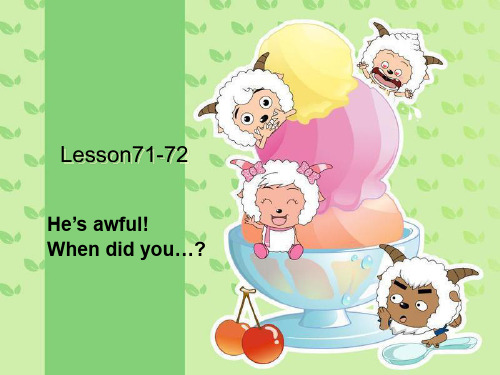
He telephoned at nine o'clock. JANE: What did you say to him? PAULINE: I said, 'This is Pauline's mother. Please don't telephone my daughter again!' JANE: Did he telephone again? PAULINE: No, he didn't!
本课重点语法
行为动词变一般过去时的构成
1.一般在动词后直接加-ed) answeq-answeqed wait---waited 2.以不发音的e结尾的动词直接加_d telephone--telephoned aqqive--aqqived 3.以辅音加y结尾的,把y改为i,再加ed empty--emptied
playing cards.
★answer v. 接(电话)
① v. 对……作出反应;响应 answer the phone/telephone answer the door/doorbell Mary took a few minutes to answer the door. ② v. 回答;答复 answer a letter I don’t think you’ve answered my question. ③ n. 答案;解决办法;答复 I wrote him several letters but couldn’t get an answer.
Do you know the answer to Question 10?
This is one of the possible answers to today’s environmental problems.
新概念第一册71和72课ppt课件
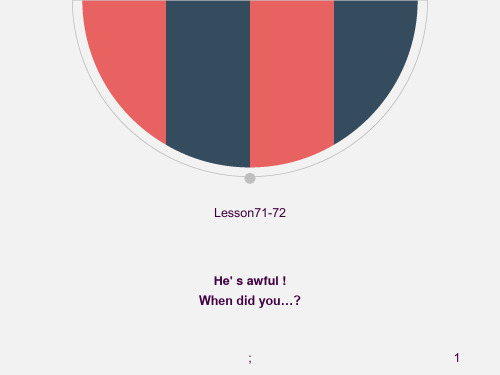
;
20
;
14
本课重点语法 一般过去过的几种基本句型
1.) 肯定句:主语+过去式+其它 如:He telephoned me four times yesterday.
2.) 否定句:主语+didn’t+动词原形+其它 如: He didn’t telephon me four times yesterday.
What's the climate like in your country?
What's the weather like in spring? 2、speak to sb. 与某人说话
May I speak to Pauline, please?
I’d like to speak to Pauline, please. 在电话中回答:This is…. 3、pretend as/to be 假装… 装作…
Lesson71-72
He' s awful ! When did you…?
;
1
New Words:
★awful adj. 让人讨厌的,坏的 awfully adv. 非常(在表示负面的情景中, 可用awfully代替very) 例句:I am awfully (very) sorry.
;
2
★time n. 次(数)- cn.
She pretended herself as her mother.
;
8
;
9
一般过去时(I)
Lesson 68, 70
概念:表示过去某一时间发生的动作或存在的状态,通常以动
语
词的过去式表示,其否定句和各种疑问句靠助动词did构成。
- 1、下载文档前请自行甄别文档内容的完整性,平台不提供额外的编辑、内容补充、找答案等附加服务。
- 2、"仅部分预览"的文档,不可在线预览部分如存在完整性等问题,可反馈申请退款(可完整预览的文档不适用该条件!)。
- 3、如文档侵犯您的权益,请联系客服反馈,我们会尽快为您处理(人工客服工作时间:9:00-18:30)。
• India • Turkey • Korea • Nigeria [naiˈdʒiəriə]
• Japan
• Russia
• Australia
• Brazil [brəˈzil]
• • • • • •
ACDFPToiaheunlnsanalaatminlrndadaidanardk[ˈdenmɑ:k•••••]
17
★ 介词 on:
(1)具体的时日和一个特定的时间, 如某日、某节日、星期几等。 on Christmas Day ;
on Monday ; on May 4th ; on April ; (2)在某个特定的早晨、下午或晚上。
He arrivs at 10 o’clock on the night of the 5th. (3)准时,按时。
19
总结
• 【in】是“大姐”,因为后面所接的都是较长 时间(月、年、季节等)。
• 【on】是 “二姐”,后面所接的时间多与日 期有关(星期、日期、具体时间、纪念日 等)。
• 【at】是“小妹”,因为接在后面的时间最 短(具体时刻或某短暂时间)。
20
4.复习countries
• England • France • Germany • Italy • America
Holland Norway Spain Sweden Greece
Lesson 71
He’s awful !
1
Everyday English
1. Just leave me alone, please! 不要管我,别理我
2.Don’t be silly! 别傻了,别异想天开了
3.Take your time. 不急!慢慢来!
2
万圣节( HALLOWEEN)
3
6
• 庆祝活动从10月31日晚开始,称为万圣节前夜 (Halloween)。主要流行在说习惯英语的一 些国家。在前夜,人们会按照风俗带上面具、 穿上奇异的衣服打扮成鬼怪的模样,家家户户 都会用南瓜雕空做成灯。孩子们会打扮好后提 着南瓜灯挨家挨户讨要糖果。人们在这天并不 拜祭祖先或鬼神。据说打扮成鬼怪模样和做南 瓜灯是为了吓跑出来作恶的鬼怪。
13
• 万圣节 - 食物 • 其他特色食品还有:粟米糖、
热苹果酒、烘南瓜子。
14
• 万圣节 - 食物 • 万圣节的传统食物是
苹果汁、爆玉米花、 南瓜馅饼和女巫状的 香料生姜饼等。
15
Review
16
★ 介词at
(1)用介词at的时间短语通常表示:
确切的时间(at 10 o’clock)
用餐时间(at lunchtime)
其他时刻(at noon/night)
年龄(at the age of 28)
节日
(at Spring Festival/Christmas等没有day的节日)
(2)介词at可表示地点,通常用于某个小地点之前。
at the butcher’s; at home;
at the office;
at the bus-station;
• 万圣节(HALLOWEEN)为 每年的10月31日。是11月 1日诸圣节的前夕,通常 叫做万圣节,这一夜是一 年中最“闹鬼”的一夜, 所以也叫“鬼节”。源自 古代凯尔特民族(Celtic)的 新年节庆,此时也是祭祀 亡魂的时刻,在避免恶灵 干扰的同时,也以食物祭 拜祖灵及善灵以祈平安渡 过严冬,是西方传统节日 。
If the train should be on time, I should reach home before dark.
18
★ 介词 in:
一天中的某段时间(in the ห้องสมุดไป่ตู้vening)
月份(in March) 年份(in 1997) 季节(in spring)
世纪(in the 20th century) 节日(in Easter week【时间长的】 ) 时期(in the holidays)
4
• 万圣节期间,许多公共场所乃至 居家院落,都会布置上很多装璜 ,诸如各式鬼怪、南瓜灯、还有 黑猫以及巫婆的扫帚之类;孩子 们会穿上每年不一样的万圣节服 装,拎着南瓜灯的提篓去挨家挨 户地讨糖,说是“trick or treat” 。
5
• 关于这一日得起源,存在四种不同的说 法,但都与鬼有关。流传至今,已经几 乎没有了任何宗教或迷信色彩成分,人 们的打扮已经不止是鬼怪,任何人都可 以随意发挥,很多地区每年都会组织举 行大型化妆游行活动,热闹非凡。
游戏是“咬苹果游戏 ” • (Bobbing for Apples) 游戏时,人们让苹果 漂浮在装满水的盆里 ,然后让参与者在不 用手的条件下用嘴去 咬苹果,谁先咬到, 谁就是优胜者。
12
• 占卜游戏 • 在爱尔兰,有一种传
统占卜游戏,参加者 蒙着眼,从放着几个 小碟的桌上选出其中 一只,如摸到的碟盛 有泥土,代表来年会 有与参加者有关的人 过身,如盛有水代表 会远行,盛有钱币代 表会发财,盛有豆代 表会穷困等等。
10
• 杰克灯 • 杰克灯是万圣节最广为人
知的象征物。在英国和爱 尔兰,当地人原本在挖空 的芜菁中燃点蜡烛造成杰 克灯,但移民到美国的人 很快便采用南瓜代替,因 为南瓜比较大和容易在上 面雕刻图案。不少家庭在 南瓜上刻上吓人的面容, 并放在大门口的阶梯上, 传统上此做法是想吓走恶 魔或妖怪。
11
• 咬苹果 • 万圣节前夜最流行的
7
• 万圣节 - 食物 • 由于万圣夜临近苹果的丰收期,太妃糖苹果
(toffee apples)成为应节食品。
8
• 黑色和橙色是万圣节
的传统颜色。现代万 圣节的产品也大量使 用紫色、绿色和红色 。秋天的元素如南瓜 和稻草人等,也成为 万圣节的象征。
9
• 不请客就捣乱
• 万圣节(万圣夜)的主要活动是“ 不请客就捣乱”(Trick-or-treat) 。小孩装扮成各种恐怖样子,逐门 逐户按响邻居的门钟,大叫: "Trick or Treat!"(意即不请客就捣 乱),主人家(可能同样穿着恐怖 服装)便会派出一些糖果、朱古力 或是小礼物。部分家庭甚至使用声 音特效和制烟机器营造恐怖气氛。 大多数家庭十分乐于款待这些天真 烂漫的小孩,于是,小孩一晚取得 的糖果往往以袋计,整袋整袋的搬 回家。
